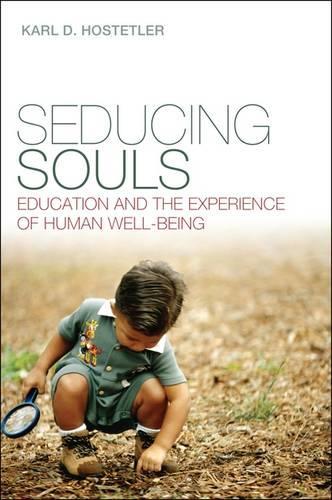
Seducing Souls: Education and the Experience of Human Well-Being
(Paperback)
Available Formats
Publishing Details
Seducing Souls: Education and the Experience of Human Well-Being
By (Author) Karl D. Hostetler
Continuum Publishing Corporation
Continuum Publishing Corporation
18th August 2011
United States
Classifications
Tertiary Education
Non Fiction
370.13
Physical Properties
Paperback
256
406g
Description
The simple premise of this book is that the purpose of education is to serve the well-being of students. Well-being might seem to be an obvious aim for education, but it has been given insufficient attention and often is poorly understood. Karl D. Hostetler asks: What does it mean for a human being to live a good life, to experience well-being How, as individuals and a society, can we debate and evaluate the quality of lives What classroom practices would be conducive to furthering the welfare of our students
Hostetler explores how teachers can "seduce" students' souls, guiding and provoking while still respecting individuals' rights to conceive and live a fulfilling life for themselves. He prompts serious reflection about the purposes of education and challenges dominant ideas about the aims of education, the politics of policy-making, and the practice of teaching. Seducing Souls argues eloquently and provocatively for the necessity of experiences that touch the soul, that elevate the young self so that students can better understand life and discern value.
Reviews
Karl Hostetler asks us to learn to live a meaningful and richly satisfying life through the education of well-being. For Hostetler, well-being includes the engagement of the body, emotion, spirit, as well as the mind. He provokes us by suggesting that we lessen control and allow ourselves to be seized and seduced by meaningful experiences. Hostetler shows that such a practice, seemingly an obvious goal in education, is not a part of today's schooling, and indeed may have been overlooked or ignored in many educational settings in the past. Through a carefully constructed and philosophically rich argument, Hostetler puts forth well-being as an educational goal in response to what he sees as a narrowing of purpose and an evacuation of a rich curriculum in today's culture of testing, standards, and accountability. Drawing upon a philosophical literature that includes Aristotle, John Dewey, Richard Bernstein, and Martha Nussbaum, Hostetler brings both philosophy and education back to considering the fundamental importance of well-being as an educational aim. He challenges technical thinking, means-end thinking, and narrowness in education with thought both nuanced and accessible. Hostetler offers teachers support for what they do by highlighting a fundamental reason one is called to teach: to enhance and promote the quality of human lives through a curriculum that supports and celebrates well-being and human capabilities. This book is a major achievement in educational philosophy that I will recommend to colleagues and students. -A. G. Rud, Dean and Professor, College of Education, Washington State University
"This book offers a well-reasoned, balanced, and wise argument for why well-being should be a guiding aim of education. Hostetler draws effectively upon a wide range of philosophical writings, while keeping his prose accessible and interesting to both the teacher and the scholar." - David T. Hansen, Professor and Director, Program in Philosophy and Education, Teachers College, Columbia University, USA.
A useful mix of policy and practice. -- Leadership Focus, Issue 52
Ultimately, then, Hostetler's book, in spite of my reservations about souls, spirituality, and yogis on mountaintops, is a powerful, timely, and highly readable defense of the central moral purpose of education. -- Judith Suissa * Institute of Education, University of London *
Author Bio
Karl D. Hostetler is Professor, College of Education and Human Sciences at the University of Nebraska-Lincoln. He is the author of Ethical Judgment in Teaching (Allyn & Bacon, 1997).
